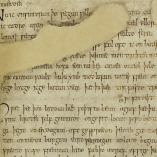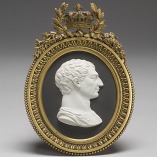
Illustration: Woodcut from the title page of The Tragicall History of the Life and Death of Doctor Faustus (1628) by Christopher Marlowe. Wikimedia Commons.
“Marlowe is—astonishingly—inventing this; it’s not as if he can draw upon Shakespeare,” says Stephen Greenblatt in this week’s episode of The World in Time. “When Shakespeare wrote Hamlet, Doctor Faustus was already written. It’s a remarkable, almost inexplicable achievement to figure out how to get inside in a play where, after all, people are standing up before 2,000 or 3,000 people and revealing something. How to get inside the character quietly. In this case, it’s a scholar who has reached the end of his rope, feels despair at the exhaustion of his own learning. It has to be something in Marlowe. It’s Marlowe’s genius, but it also has to draw upon something deep inside him and his experience. Shakespeare couldn’t do quite that. Shakespeare does amazing things with Hamlet and with Prospero in The Tempest, but he wasn’t at university and wasn’t intellectual in the sense that Marlowe was trained. So this is Marlowe’s extraordinary invention, and you have to think that Marlowe was murdered at twenty-nine. If Shakespeare had been murdered at the age of twenty-nine, we would say, ‘Shakespeare, who’s that?’ ”
This week on the podcast, Donovan Hohn speaks with Stephen Greenblatt, Shakespeare scholar and Pulitzer Prize-winning author, about Greenblatt’s new book, Dark Renaissance: The Dangerous Times and Fatal Genius of Shakespeare’s Greatest Rival, a history of the life and times of Christopher Marlowe, cobbler’s son turned gentleman-scholar, turned spy in Queen Elizabeth’s secret service, turned playwright and poet who collaborated with Shakespeare. In Greenblatt’s telling, Marlowe’s career, cut violently and mysteriously short, is almost as improbable and tragic as that of his most famous creation, Doctor Faustus.
WORKS CITED
(In order of mention.)
Lewis H. Lapham. “Episode 13: Stephen Greenblatt.” The World in Time from Lapham’s Quarterly, September 15, 2017.
Lewis H. Lapham. “Episode 28: Stephen Greenblatt.” The World in Time from Lapham’s Quarterly, June 1, 2018.
Stephen Greenblatt. Dark Renaissance: The Dangerous Times and Fatal Genius of Shakespeare’s Greatest Rival. New York: W.W. Norton & Company, 2025.
Niccolò Machiavelli. The Prince. Edited by Quentin Skinner and Russell Price. Introduced by Quentin Skinner. Cambridge: Cambridge University Press, 2019.
Niccolò Machiavelli. Discourses on Livy. Translated by Julia Conaway Bondanella and Peter Bondanella. Oxford: Oxford University Press, 2009.
Thomas More. Utopia. Edited by George M. Logan. Translated by Robert M. Adams. Cambridge: Cambridge University Press, 2016.
Thomas Norton and Thomas Sackville. Gorboduc. Edited by Paul Frazer and Harriet Archer. Manchester: Manchester University Press, 2026.
Ovid. Metamorphoses. Translated and introduced by Stephanie McCarter. New York: Penguin Books, 2023.
Virgil. The Aeneid. Translated by Sarah Ruden and introduced by Susanna Braund. New Haven, CT: Yale University Press, 2021.
Catullus. The Poems of Catullus. Edited, translated, and introduced by Guy Lee. Oxford: Oxford University Press, 2009.
The Book of Common Prayer. Cambridge: John Baskerville, 1762.
Christopher Marlowe. “Ovid’s Elegies.” In The Complete Works of Christopher Marlowe, Volume Two. Edited by Fredson Bowers. Cambridge: Cambridge University Press, 2008.
John le Carré. The Spy Who Came in from the Cold. New York: Penguin Books, 2013.
Sir Thomas Wyatt. “Who list his wealth and ease retain.” In Sir Thomas Wyatt: The Complete Poems. Edited by R.A. Rebholz. New Haven, CT: Yale University Press, 1981.
Mario Puzo and Francis Ford Coppola, creators. The Godfather. Paramount Pictures, 1972.
Vince Gilligan, creator. Breaking Bad. Sony Pictures Television, 2008.
William Shakespeare and Christopher Marlowe. “Henry VI, Parts One, Two, and Three,” in The New Oxford Shakespeare: The Complete Works. Edited by Gary Taylor, John Jowett, Terri Bourus, and Gabriel Egan. Oxford: Oxford University Press, 2016.
William Shakespeare. “King Lear.” In The New Oxford Shakespeare: The Complete Works. Edited by Gary Taylor, John Jowett, Terri Bourus, and Gabriel Egan. Oxford: Oxford University Press, 2016.
Christopher Marlowe. Tamburlaine the Great. Edited by J.S. Cunningham and Eithne Henson. Manchester: Manchester University Press, 1999.
Ben Jonson. “To the Memory of My Beloved the Author, Mr. William Shakespeare.” The Poetry Foundation.
Thomas Preston. Cambyses King of Persia. London: John S. Farmer, 1910.
Clarence Ashley and Gwen Foster. “Rising Sun Blues.” New York: Vocalion, 1933.
Robert Greene. A Groatsworth of Wit. London: John Hauiland, 1629.
Christopher Marlowe. The Jew of Malta: A Norton Critical Edition. Edited by Lloyd Edward Kermode. New York: W.W. Norton & Company, 2020.
Christopher Marlowe. Doctor Faustus: A Norton Critical Edition. Edited by David Scott Kastan and Matthew Hunter. New York: W.W. Norton & Company, 2023.
Christopher Marlowe. “Edward II.” In The Complete Works of Christopher Marlowe, Volume Two. Edited by Fredson Bowers. Cambridge: Cambridge University Press, 2008.
Richard Burton, director. Doctor Faustus. Columbia Pictures, 1967.
William Shakespeare. Hamlet: A Norton Critical Edition. Edited by Robert S. Miola. New York: W.W. Norton & Company, 2019.
William Shakespeare. The Tempest: A Norton Critical Edition. Edited by Peter Hulme and William H. Sherman. New York: W.W. Norton & Company, 2019.
William Shakespeare. Titus Andronicus. Edited by Alan Hughes. Cambridge: Cambridge University Press, 2006.
William Shakespeare. The Two Gentlemen of Verona. Edited by Roger Warren. Oxford: Oxford University Press, 2008.
Christopher Marlowe. “Hero and Leander.” In The Complete Works of Christopher Marlowe, Volume Two. Edited by Fredson Bowers. Cambridge: Cambridge University Press, 2008.
The History of the Damnable Life and Deserved Death of Doctor John Faustus: 1592; Together with The Second Report of Faustus: Containing His Appearances and the Deeds of Wagner: 1594. Edited by William Rose. London: George Routledge & Sons, 1925.






